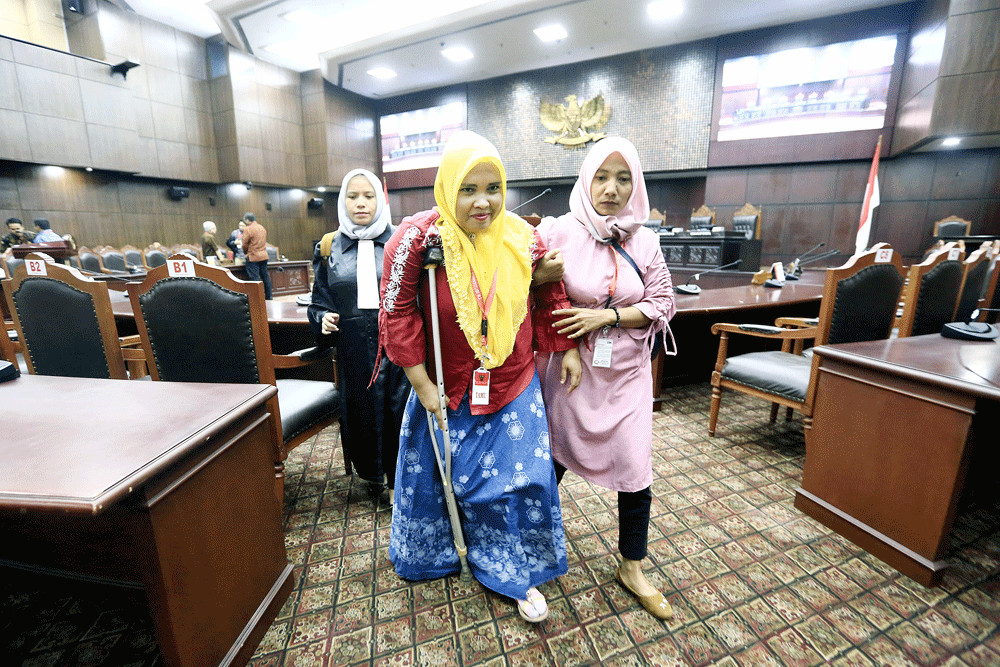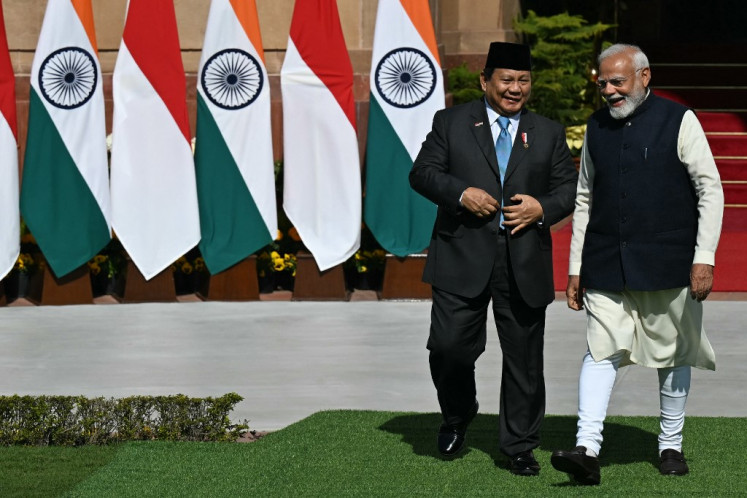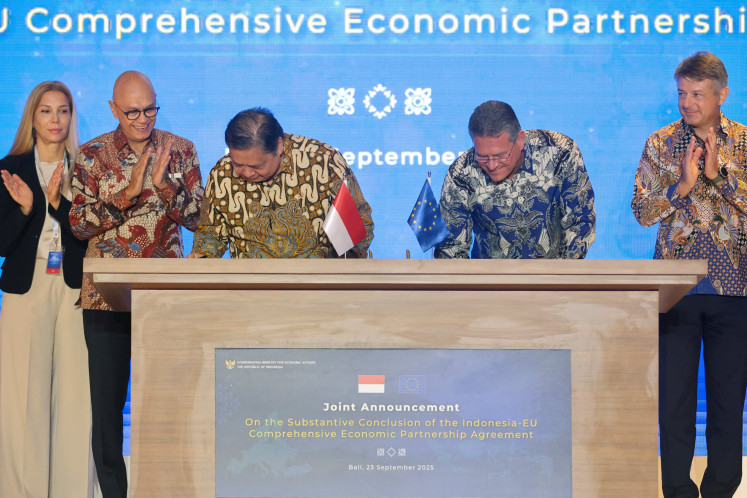Popular Reads
Top Results
Can't find what you're looking for?
View all search resultsPopular Reads
Top Results
Can't find what you're looking for?
View all search resultsWhy women ulema reject patriarchy
The challenge of pluralism that Indonesia faces today is the strengthening of identity politics, where women are among the targets of patriarchal ideals hiding behind the robes of religion.
Change text size
Gift Premium Articles
to Anyone
 Too young to be married: Plaintiffs Rasminah (left) and Endang Wasrinah leave the courtroom after a hearing regarding the Marriage Law at the Constitutional Court in Jakarta on Thursday. The court consented to their request for a judicial review of the minimum age for women to marry. (The Jakarta Post/Dhoni Setiawan )
Too young to be married: Plaintiffs Rasminah (left) and Endang Wasrinah leave the courtroom after a hearing regarding the Marriage Law at the Constitutional Court in Jakarta on Thursday. The court consented to their request for a judicial review of the minimum age for women to marry. (The Jakarta Post/Dhoni Setiawan )
T
he challenge of pluralism that Indonesia faces today is the strengthening of identity politics, where women are among the targets of patriarchal ideals hiding behind the robes of religion. Religion is used to justify polygyny and child marriage, among other things.
Increasing efforts to revive polygyny as an acceptable practice often refer to Prophet Muhammad’s household, though some of his wives were older. Likewise, child marriage is seen as a way to preserve a girl’s morality and purity by avoiding sinful premarital sex. The strategy of appealing to religious purity juxtaposes “us” with “them” — “infidels”, “the West” and “Westerners”.
This leads to ahistorical and meaningless interpretations of religious texts. The policing of women and their bodies is considered necessary to uphold religion.
We see, for instance, advertisements on chat groups promoting seminars or training on “fast polygyny” with fees of Rp 3.5 million (US$241.30) to ensure “responsible” polygyny supposedly in line with the practice of the Prophet, or a cheap marriage package guaranteed to be syar’i (in line with sharia) for those under 18.
Meanwhile, child marriage has reached emergency proportions. According to a report by the United Nations International Children’s Emergency Fund, “State of the World’s Children 2016”, one in seven girls in Indonesia is married as a child.
Thus, Indonesia ranks second among the 10-member ASEAN and seventh internationally in the prevalence of child marriage.
Among many factors, including poverty, studies by the Rumah KitaB research center show that religiosity, especially the wish to preserve morality, plays a very significant role in child marriage.
The impacts on women who get married as children include dropping out of school, exposure to domestic violence, poor reproductive health and even death related to pregnancy and complications in labor, apart from poverty.
Women in a polygynous marriage also often lack access to social protection, many have neither birth nor marriage certificates and lack legal documents for inheritance, among other negative consequences.
The 1974 Marriage Law essentially upholds monogamous marriage and limits child marriage. However, polygyny and child marriage appear to be on the rise; justifications found in the same law include conditions for taking another wife and legal permission even for children under 16 to marry based on parental request.
Yet, women and girls in polygyny and child marriage are legally unprotected, because most of the unions are unregistered and undocumented.
A historic breakthrough occurred on Dec. 13: The Constitutional Court ruled to end child marriage, though the demanded increase in the marriage age requires a change of the 1974 law to become effective. The ruling followed the third attempt at changing the law, with the main plaintiffs including women that had been married as children.
Women ulema have long felt the need to respond to religious views that are detrimental to women, by offering a new perspective inspired by the Islamic spirit of justice and protection.
As a member of the Muhammadiyah Islamic organization and the Indonesian Women Ulema Congress (KUPI), I have witnessed the progress of women in Indonesia in addressing continued abuse against women and girls.
Aisyiyah, the women’s wing of Muhammadiyah, and the Muhammadiyah councils of fatwa and Islamic reform in Makassar this year issued a fatwa on children (fikih anak) that states the minimum marrying age should be 18 for males and females, who are generally physically and psychologically mature at this age.
In its book Keluarga Sakinah (Family with Tranquillity) published in 1982, Muhammadiyah promoted the understanding of the ideal family based on the principle of monogamy.
Such teachings and legal opinions had progressed far beyond the state policy under the 1974 Marriage Law.
Meanwhile, KUPI’s initial congress in 2017 produced three fatwas, one being that preventing child marriage is mandatory, because child marriage brings about damage and harm rather than bringing families closer to a household of tranquillity, love (mawaddah) and compassion (wa rahmah).
Such fatwas from Muhammadiyah and the KUPI should always guide efforts to increase awareness of the dangers of child marriage and polygyny.
At a recent expert conference on pluralism in Paris in November, speakers shared how teachings of faith and custom continued to corner women, even justifying violence against them.
At least in Indonesia, I told participants, Statistics Indonesia (BPS) has begun to record instances of violence against women, following efforts of women groups and the National Commission on Violence against Women.
We heard how in Nigeria, according to Benedicta Daber, director of Justice
Development and Peace Caritas, many women face poverty if they separate from their husbands, or continued domestic abuse if they don’t, as the religion did not allow divorce.
When a husband dies, the woman either must marry a man from the husband’s family if she wants to survive and obtain her husband’s inheritance, or leave everything behind, including property and children.
A leading imam of Nigeria, Muhammad Ashafa, said the practice of polygyny reflected more on the perspective of the imam or cleric and was not an Islamic tradition.
The Quran drastically limited the number of wives to four from the unlimited number of wives permitted to men in past Arabian societies.
As even leading imams have acknowledged that polygyny is not Islamic, upholding monogamy and abolishing child marriage requires further support. Muhammadiyah and the KUPI have started with the above fatwa and legal opinions, which have been incorporated in the draft on the revision of the Marriage Law.
The law’s revision requires a huge commitment from various sides, including politicians, amid resistance from those seeking to uphold patriarchy in the guise of religion. Legislative candidate Grace Natalie of the Indonesian Solidarity Party (PSI) has spoken up clearly on monogamy.
Indeed, monogamy is not only in line with the Islamic principles of ‘adilah(justice) and mubadalah (reciprocity) but also the principle of democracy that requires justice to be assured by the state, even in the most personal sphere of the household.
The fatwa from the KUPI and Muhammadiyah councils should be constantly promoted at the local, national and international level. Though nonbinding, they provide breakthroughs to obsolete laws and narrow interpretations of Islam with vested interests of perpetuating patriarchy.
Religious figures and organizations must speak up against challenges to our pluralism, which also victimize women and girls with various justifications.
When religious figures lack formula to protect women, they should at least recognize the above breakthroughs and pass on such fatwas to their grassroots communities.
***
The writer is a lecturer at the Ahmad Dahlan Institute of Technology and Business Jakarta (STIE-AD) a member of the Law and Human Rights Council’s National Board of Aisyiyah, the women’s wing of Muhammadiyah, and program manager of Alimat, Indonesian Women Ulema Congress (KUPI). She was a speaker at a discussion on pluralism held in November by Pharos Observatoire in Paris.










